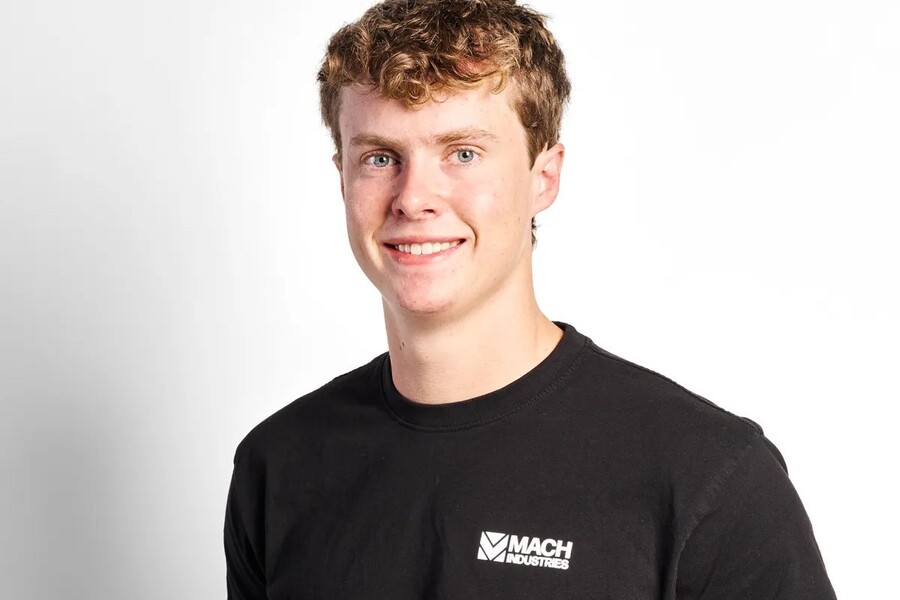Defense tech startup Mach Industries has raised $100 million in new funding at a $470 million valuation, signaling both continued investor confidence and a maturing outlook as the company ramps up production and development of cutting-edge weapons systems.
Founded just two years ago by MIT dropout Ethan Thornton, Mach Industries is one of the youngest and most aggressively scaling players in the defense technology space. The company confirmed the latest funding round today, co-led by Keith Rabois of Khosla Ventures and Geoff Lewis of Bedrock Capital, with participation from Sequoia Capital. This brings Mach’s total funding to approximately $185 million since its inception in 2023.
A Strategic but Measured Step Forward
While the funding amount is substantial, the valuation reflects only a modest increase compared to the company’s $335 million post-money valuation during its Series A raise in October 2023. The current valuation of $470 million — factoring in the size of the new investment — suggests that investor enthusiasm, while present, is becoming more measured in a defense tech market that is both increasingly vital and highly scrutinized.
Despite this cautious optimism from backers, Mach’s operational momentum is undeniable.
Rapid Expansion and Cutting-Edge Capabilities
Over the past year, Mach Industries has grown from a modest 20-person team to a staff of 140, according to CEO Thornton. The company now boasts a trio of highly advanced weapons systems already in development or testing:
- Viper: A lightweight, jet-powered unmanned aerial vehicle (UAV) capable of vertical takeoff and landing (VTOL), requiring no runway.
- Glide: A high-altitude glider designed for long-range precision strikes from the edge of the atmosphere.
- Stratos: An airborne satellite equipped with sensors and communications technologies for sustained high-altitude operations.
These platforms signal a clear focus: creating tactical advantages through speed, autonomy, and vertical launch capabilities — areas where traditional defense contractors often face limitations in speed and cost.
Real-World Contracts and Infrastructure
Earlier this year, Mach Industries was selected by the U.S. Army Applications Laboratory to develop a vertical takeoff precision cruise missile, a critical endorsement from the Department of Defense. The company also announced its first major manufacturing site — a 115,000-square-foot factory in Huntington Beach, California — marking a shift from makeshift plywood desks in a Cambridge apartment to full-fledged industrial operations.
Thornton, now just 21, reflected on the startup’s humble origins: “We went to Home Depot, bought a bunch of plywood and 2x4s, and built all the furniture ourselves. I’d say we’re still equally scrappy — but now it’s very, very exciting to have a full factory and a team that’s equal parts industry veterans and new minds.”
Aligning with National Security Needs
Thornton is quick to note that Mach isn’t operating in isolation. The company collaborates directly with the U.S. Department of Defense, the State Department, and Congress, ensuring that its developments align with national defense strategies and ethical constraints. “The work we do is done in direct contact with… national defense decision-makers,” he said.
He also acknowledges the heavy responsibility that comes with building weapons during a time of AI-driven conflict and geopolitical volatility. Referencing Ukraine’s recent AI-coordinated “Spider Web” drone attacks on Russian targets, Thornton believes Mach and its peers are at the forefront of a fundamental shift in how wars are fought — using smarter, more agile, and more cost-effective systems.
What’s Next for Mach Industries?
The $100 million injection will help the company further scale its manufacturing capabilities and fund the research and development of new, undisclosed products. Among them is a next-generation propulsion system that Thornton has yet to reveal details about but hints could significantly advance the state of battlefield mobility and range.
Though Mach’s valuation hasn’t skyrocketed in this latest round, the company’s trajectory remains steep in terms of both capability development and strategic relevance. In a defense landscape increasingly shaped by drones, AI, and high-altitude platforms, Mach Industries is positioning itself not just as a disruptor but as a vital contributor to the next era of national security technology.
Why This Matters to Readers:
- For defense analysts: Mach’s rise highlights how nontraditional players are transforming the defense landscape.
- For investors: The modest valuation increase signals a cooling but still confident venture capital environment for defense startups.
- For the public: It underscores how AI, advanced manufacturing, and startup culture are reshaping the future of warfare — and the ethical questions that come with it.
Stay tuned, as Mach’s next moves could redefine the battlefield.


